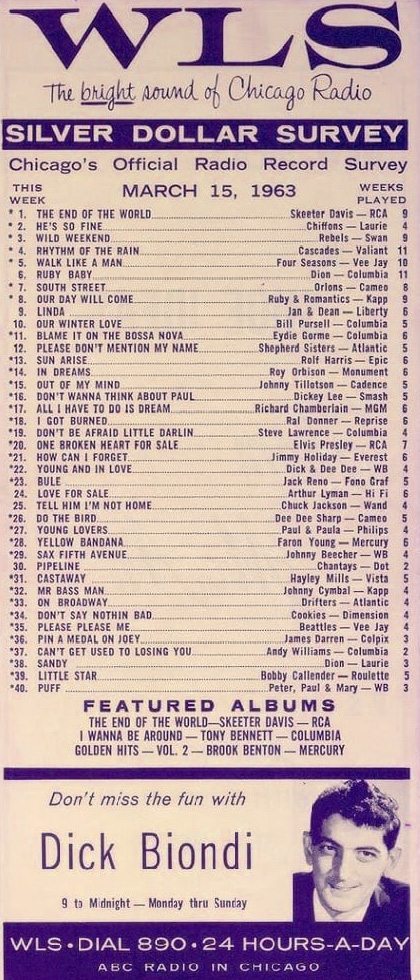KRLA and the Beat history
KRLA personalities
KRLA specialties
Some guys from Liverpool

With KRLA's talent lineup beginning to gel in 1963, there were still several prominent hires to be made, much to the station's benefit. One involved a fellow well-known to John Barrett, station manager, who was likely the driving force in his hiring.
Barrett had worked with Dick Biondi and Perry Allen at WKBW in Buffalo, where Biondi had been a force to be reckoned with -- his temper was well-known in the industry, but so was his talent. Biondi had moved to WLS-AM in Chicago and so far as anyone can determine was the first American deejay to play a song by an english group with a peculiar name.
The WLS Survey for March 15, 1963 recorded The Beattles (as it was spelled, the fault of Vee Jay's record label) with "Please Please Me" at number 35 after four weeks on the station charts. A few weeks after this auspicious debut, Biondi was fired from WLS, ostensibly because of a dispute over the number of commercials he was required to air. Footloose and fancy-free, Biondi joined KRLA in July 1963.
It was probably no coincidence that another Beatles track entered KRLA's Tunedex for the week of July 14, 1963. "From Me To You," the Beatles third single, debuted on KRLA at number 46 that week, and I'm betting that Biondi suggested that it be added to the station playlist.
An article by Robert Feder in 2014 quotes Biondi's recollection of the situation at KRLA. “When I took the records with me to the West Coast in the summer of ’63, I played them in Los Angeles and got calls from kids who said, ‘Take that crap off and play the Beach Boys,’” Biondi recalled.
Maybe so! It was hardly a down time for good rock and roll and proto-folk music, as this Oldiesloon transcription indicated. Among the records on KRLA's list that week were nifty tunes by Jan & Dean, The Astronauts, Marvin Gaye, Elvis Presley, The Orlons, Peter Paul & Mary, Little Stevie Wonder, and a host of others. Perhaps the time wasn't quite right for the Mersey Sound.
This LA Observed article from 2007 suggests that sometone within KRLA in mid-1963 was well aware of the Beatles and even suggested bringing them to Los Angeles for a concert. If this too was Biondi he would have had to be extraordinarily prescient. Radio airplay was one thing. Investing in a concert, with all its attendant costs of venue rental and crowd management, would have been a big gamble with an unknown group whose American airplay was spotty at best. However apparently, according to the anecdote, it sparked an interest in Brian Epstein, who remembered KRLA the following year.
While the Beatles were making big waves regionally in England in concert venues and on the BBC, they were hardly news in the United States, although a few domestic radio stations took a chance on Beatles records from April through September 1963 in addition to KRLA, including KFXM in San Bernardino, California, WQAM Miami, KNUZ Houston, KEWB San Francisco, WEPM Martinsburg West Virginia, and WORC in Worcester Massachussetts.
All this changed spectacularly as 1963 approached autumn of that year. By November 1963 the New York Times began to cover the presence of something noteworthy on the British music scene. Billboard started reporting on enormous record sales by the Beatles, who by this time dominated the British charts. CBS, NBC, and ABC all sent television news crews in mid-November 1963 to cover a Beatles concert in Bournemouth. Some of that footage aired on November 21 and the morning of November 22 on national news programs. The Kennedy assassination later that day overwhelmed any other news coverage of the Fab Foursome in England.
It wasn't until December 10, 1963 that CBS re-aired part of its coverage about the Beatles on its CBS Nightly News program with Walter Cronkite. This itself sparked a plethora of interest in the music group. WWDC-AM in Washington DC famously aired a tape of "I Want To Hold Your Hand" and the gloves were off. Radio stations across the country scrambled for taped copies of the song in advance of its official release by Capitol Records, who were caught napping during the initial explosion of American Beatlemania.
John Barrett may have been some help here for KRLA. He spent a great deal of time in Washington DC monitoring the situation with KRLA and its everlasting license issues. Did he hear the buzz and convey it to Dave Hull, the newly-hired 9pm-to-midnight deejay who was tasked with representing the Beatles' fan club at KRLA? Not surprising, if so! Or was it program director Dick Moreland, who had a knack for discovering new music trends? It could have been both. Whoever it was, KRLA was on the fast track to becoming the number-one Beatles station in the Los Angeles market. Rival station KFWB never quite recovered.